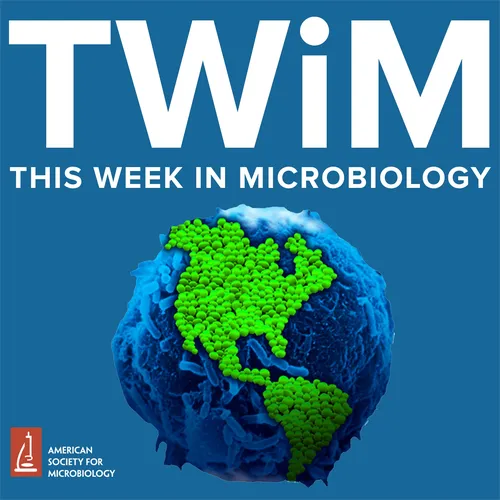
This Week in Microbiology
This Week in Microbiology is a podcast about unseen life on Earth hosted by Vincent Racaniello and friends. Following in the path of his successful shows 'This Week in Virology' (TWiV) and 'This Week in Parasitism' (TWiP), Racaniello and guests produce an informal yet informative conversation about microbes which is accessible to everyone, no matter what their science background.
- Update frequency
- every 15 days
- Average duration
- 63 minutes
- Episodes
- 341
- Years Active
- 2011 - 2025

180: Microbecentricity with Mark O. Martin
Vincent speaks with Mark O. Martin about microbial centricity, teaching undergraduates microbiology, lux art, painting with glowing bacteria, tardigrades and much more at ASM Microbe 2018.
Host: Vinc…

179: Viable but not culturable
The TwiModulators discuss aerosolization of bacteria and viruses in an ocean-atmosphere mesocosm, and how the common practice of decontaminating produce with chlorine produces viable but non-culturab…

178: Corals are sexy with Christina Kellogg
The TWiM team travels to ASM Microbe 2018 in Atlanta, Georgia to speak with Christina Kellogg about her career and her research on coral microbial ecology.
Hosts: Vincent Racaniello, Michael Schmidt,…

177: Microbial sibling conflict
The TWiM team discuss bacteriophage evolution in a dairy plant, and killing of less fit cells among social microbes.
Hosts: Vincent Racaniello, Michael Schmidt, Michele Swanson, and Elio Schaechter.
…

176: Elio has lots of colanic acid
Vincent, Michael and Elio note the passing of Stanley Falkow, give E. coli an archaeal membrane, and show how the microbiome can make worms live longer.
Hosts:

175: Neomycin is antiviral
The TWiM team notes the passing of Allan Campbell, and explains how aminoglycoside antibiotics like neomycin enhance host resistance to viral infection.
Hosts:

174: A Gathering Typhoid Storm
The TWiMsters explain why untreatable typhoid fever might be on the way, and the evolution of fungal virulence in tropical frogs.
Hosts:
Vincent Racaniello, Michael Schmidt, and Elio Schaechter.
Su…

173: Gee whiz in style
The Masters of the Microbiological Universe discuss the humongouest fungus, and a commensal bacterium that protects against skin neoplasia.
Hosts:

172: Unfolding relaxases and soil malacidins
The TWiMmers discuss culture-independent discovery of malacidin antibiotics, and unfolding of relaxase during bacterial conjugation.
Hosts:

171: If you give a bee a fungus
The TWiM team explores a stingless bee that requires a fungal steroid to pupate, and colonic biofilms containing tumorigenic bacteria in patients with colorectal polyps.
Hosts:

170: Rats, lice, and nanoparticles
The TWiM team reveals that spread of plague was likely by human ectoparasites, not rats, and deconstruct a durable, broadly protective protein nanoparticle influenza virus vaccine.
Hosts:

169: Breatharian Bacteria
The cast of TWiM reveals how uropathogenic E. coli use a copper-binding protein to treat copper as a nutrient or a toxin, and Antarctic soil bacteria that survive on trace atmospheric gases.
Hosts:

TWiM #168: The lesser of two weevils
Dickson joins the TWiM team to discuss the nasal microbiota of dairy farmers, and attenuation of bacterial virulence by quorum sensing in the maize weevil.
Hosts:

TWiM #167: I have one word for you: Flink
How pandemic influenza viruses suppress immunogenic cell death, and 3D printing of bacteria into functional materials.

TWiM #166: Dark fermentation
Vincent and Elio discuss the reason for poor efficacy of one of the influenza virus vaccines, and using a hyperthermophilic anaerobe to produce hydrogen from fruit and vegetable wastes in seawater.
H…

TWiM #165: Pumping Copper
The TWiM team discusses the use of copper on exercise weights to reduce bacterial burden, and the mechanism of antigenic variation by which a fungus that causes severe pneumonia escapes the immune sy…

TWiM #164: Indiana Quorum
From Indiana University, Vincent speaks with Ankur, Julia, and Xindan about their careers and their work on horizontal gene transfer, quorum sensing, and chromosome organization in bacteria.
Guests: …

TWiM #163: Saliva and sptR/S
This episode is all about saliva: how certain bacteria survive in it, and how swallowing saliva might cause intestinal inflammation.
Links for this episode:
- Genes for the Streptococcus pyogenes fitn…

TWiM #162: Intracellular bacteria with flagella
The TWiM hosts and associated microbiomes review a fungus destroying salamanders in Europe, and genes for flagella in intracellular bacteria.
Hosts:

TWiM #161: Eros, a bacterial aphrodisiac
From the TWiM team, a discussion of Hurricane Harvey microbiology, and a bacterial enzyme that induces eukaryotic mating.
Hosts:
Vincent Racaniello, Michael Schmidt, Michele Swanson and Elio Schaech…